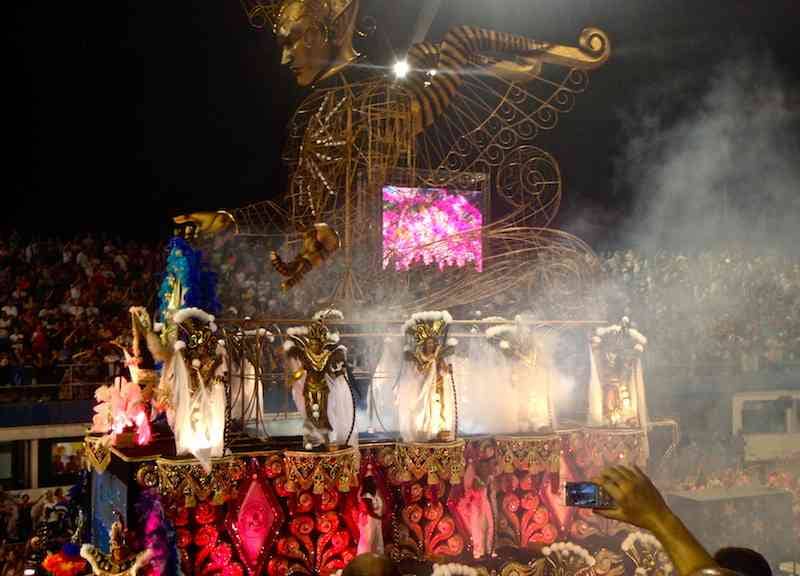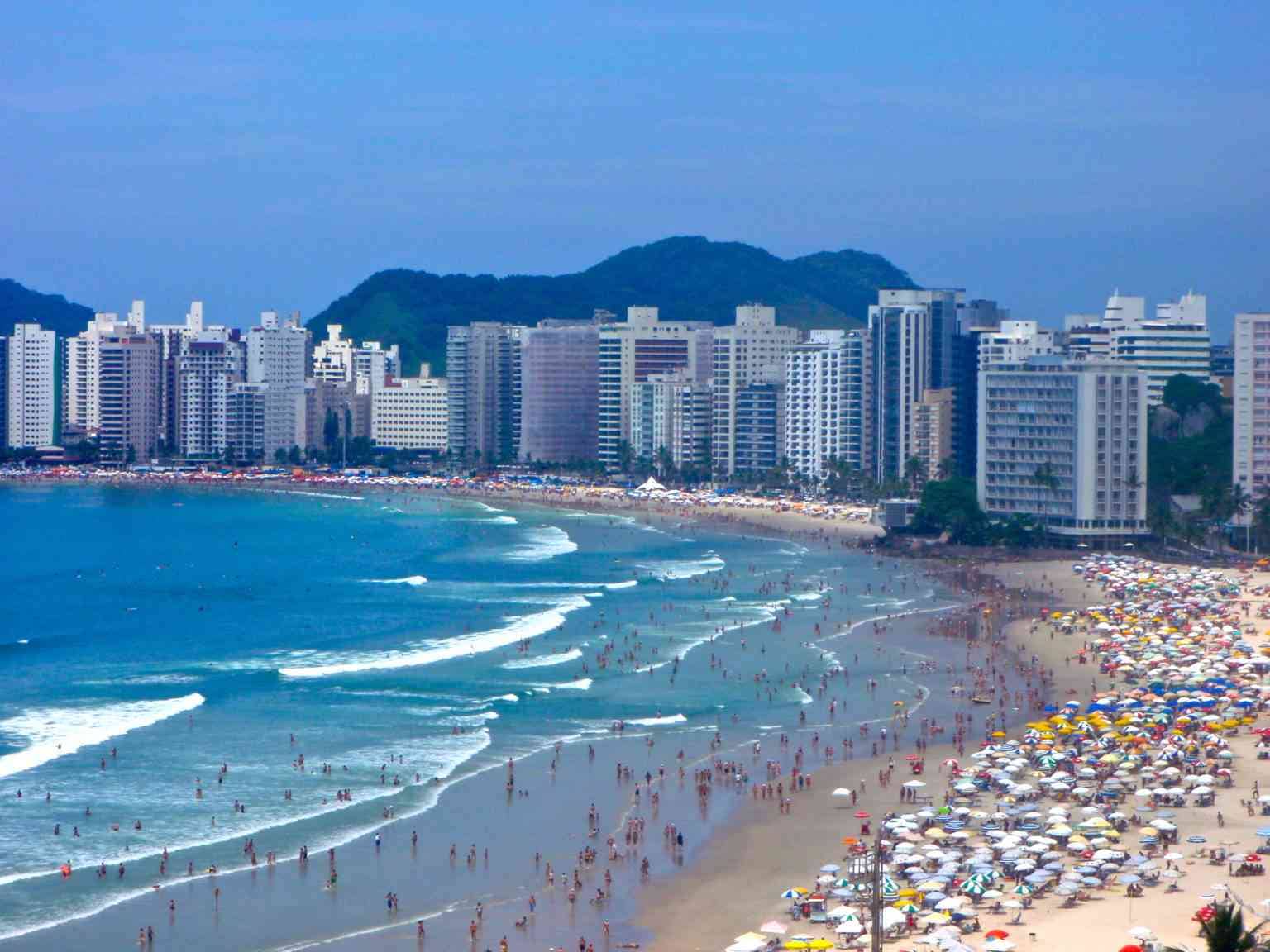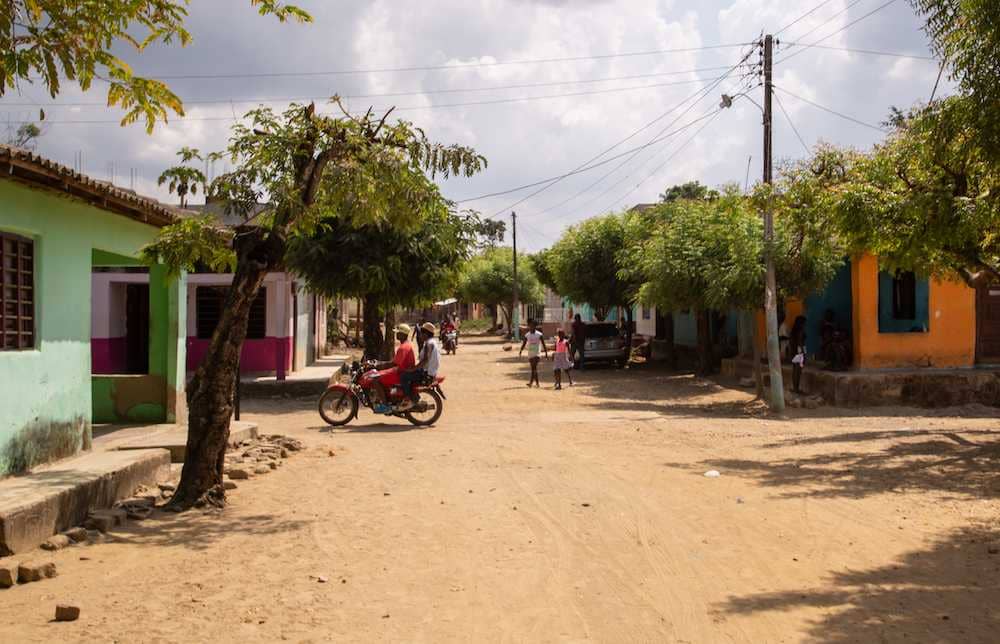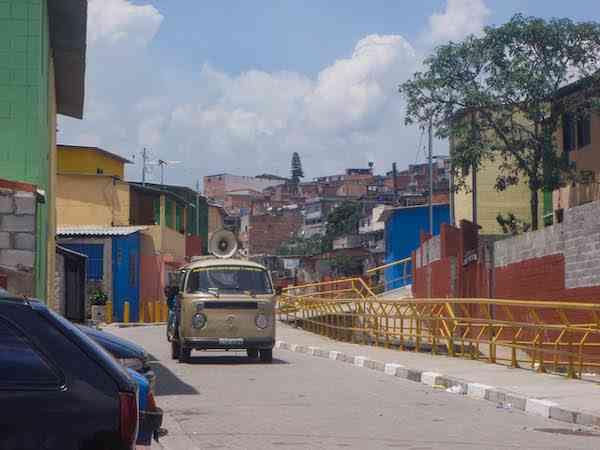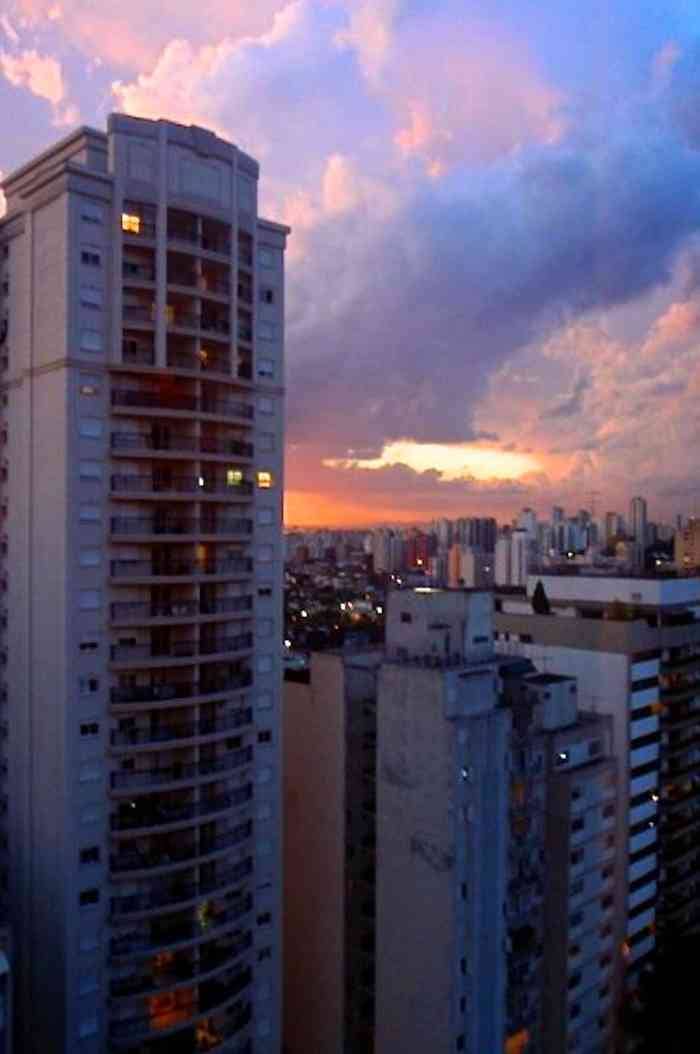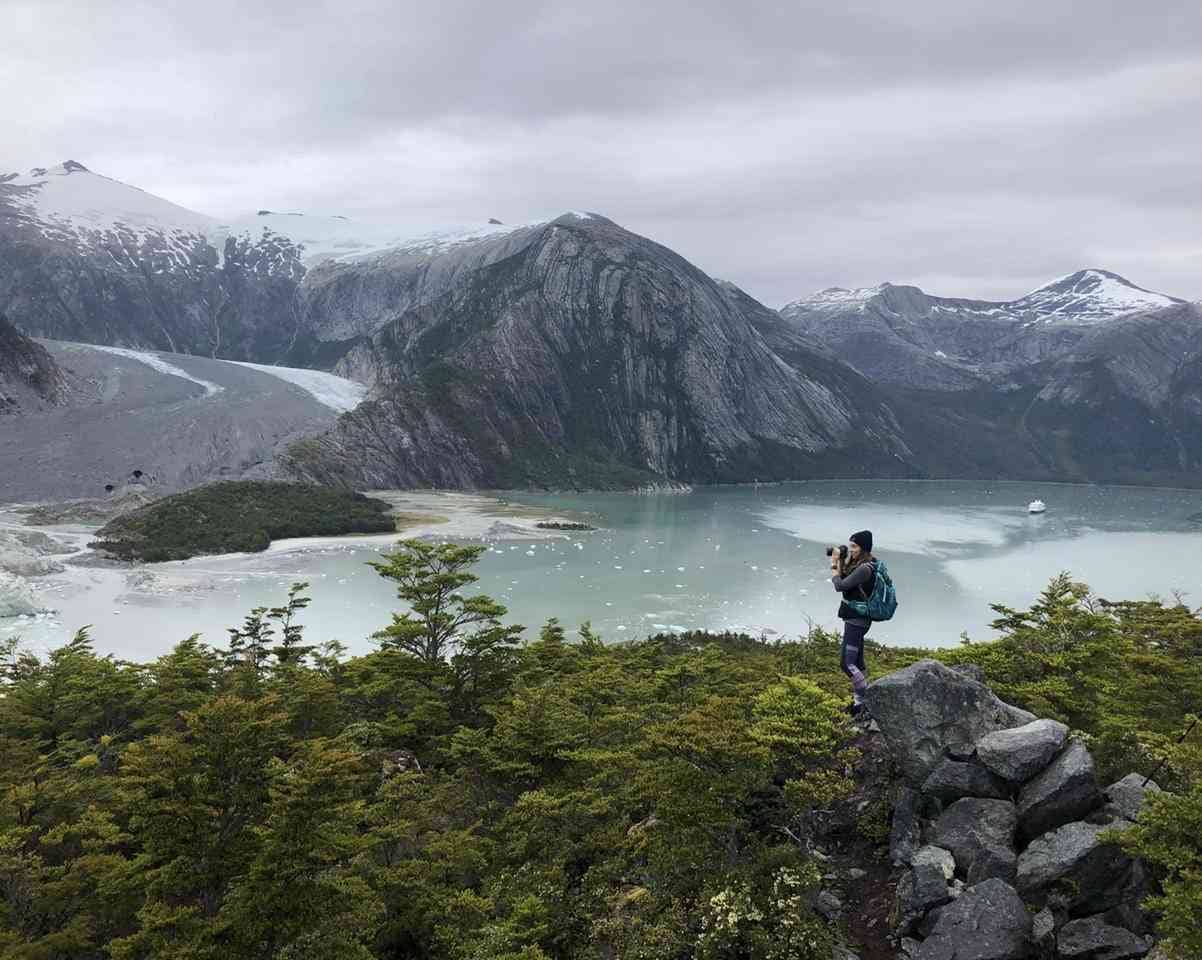What To Do In Ushuaia: The Southernmost City in the World
An article on what to do in Ushuaia may seem weird to anyone who’s been there. After all, most people who end up in “el fin del mundo” – the end of the world – in Ushuaia are there to get somewhere else, not explore the city itself.
The southernmost city in the world is the starting point for many epic trips. Ushuaia to Antarctica is a popular sailing and flight route. Many people also start their exploration of Patagonia at large from Ushuaia.
Disclaimer: Lose the Map contains affiliate links and is a member of Amazon Services LLC Associates Program. If you make a purchase through an affiliate link, I receive a small commission at no extra cost to you.
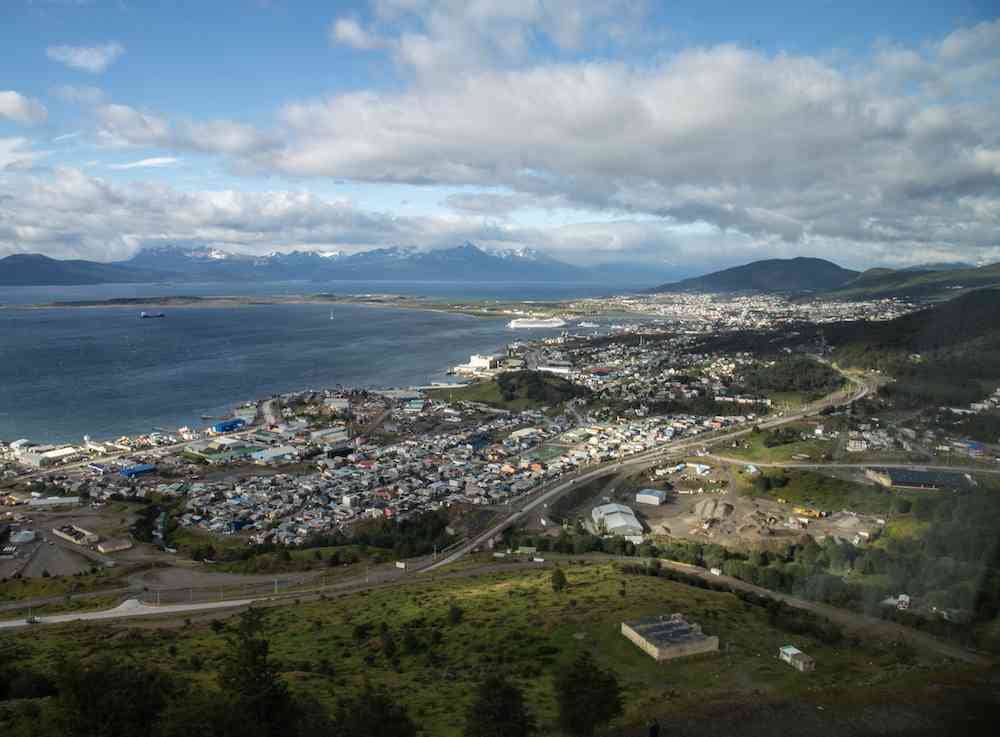
Argentinians themselves seem to overlook or forget about Ushuaia. One night out in Salta, Argentinian music was playing in the background. My friends proceeded to tell me which parts of Argentina each style of music came from. Since I would be going soon, I asked out of curiosity – “what kind of music does Ushuaia have?”. They laughed and looked at each other. One of them swept his hand in front of him and answered “the wind…”. Then burst out laughing.
So it was clear to me: even Argentinians view Ushuaia as the country’s forgotten outpost.
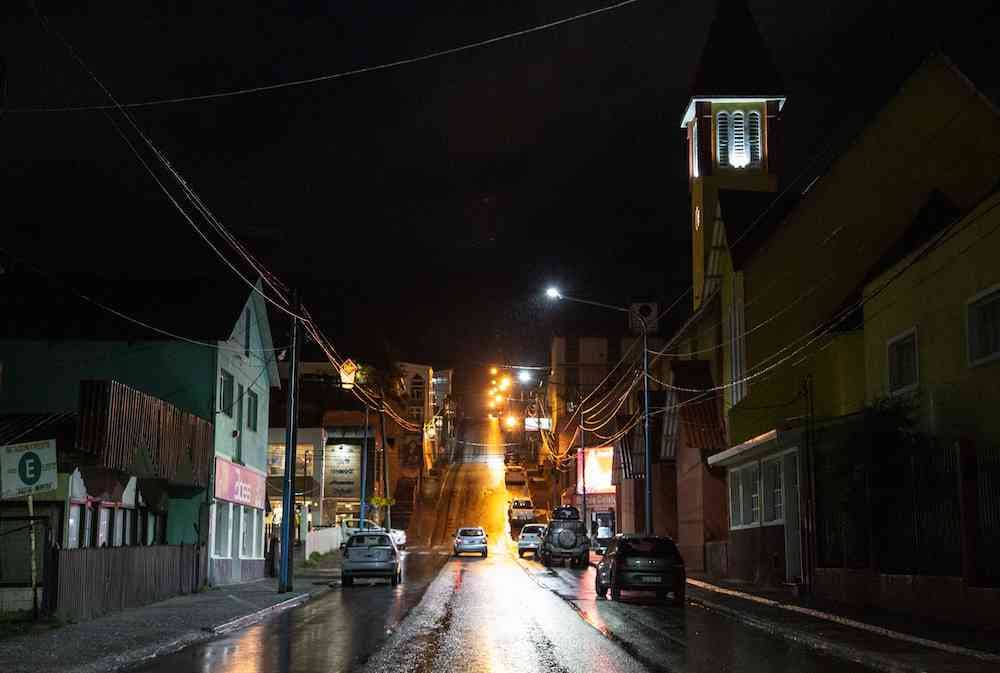
However, there are actually plenty of cool things to do around Ushuaia. From museums and shipwrecks in town, to a whole slew of outdoor activities. If you have the time, I definitely recommend spending at least 2-3 days there before starting your Patagonia journey.
What’s So Special About Ushuaia?
Ushuaia, Argentina, is considered the southernmost city in the world. With a population of around 57,000 people, it’s at the very cold, windswept end of South America, located right on the Beagle Channel.
Know Before You Go: The Ushuaia climate is mild, but on the chiller side. Temperatures range from an average of 34F/1C in winter (July) to 40 F/10C in summer. No reason to bring shorts.
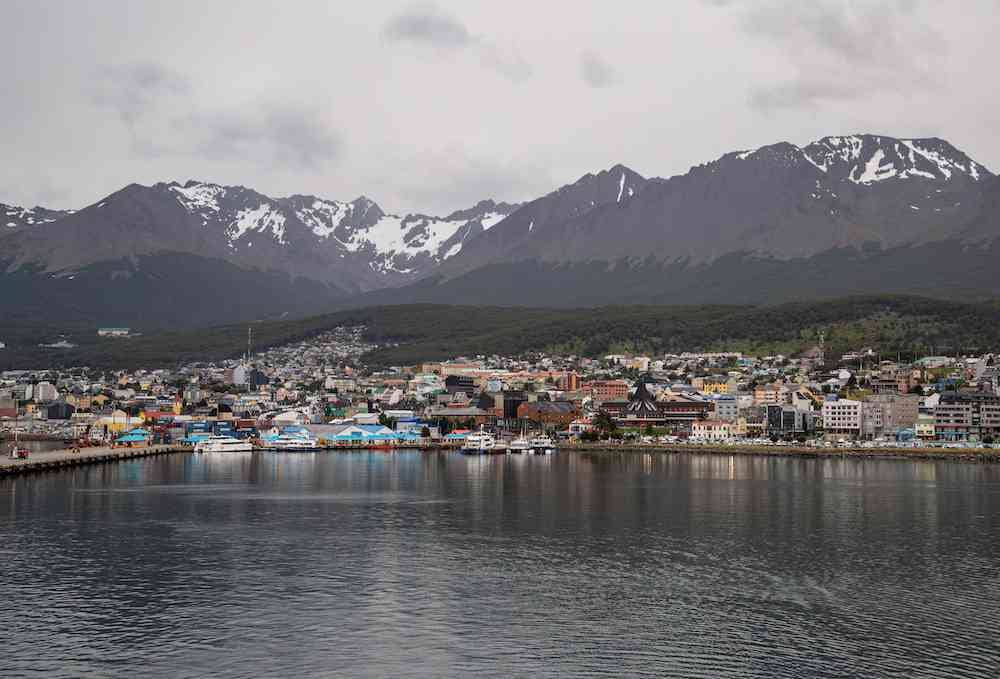
The rugged city is only 680 miles from Antarctica, which makes it a popular launching point for those beginning a journey there, or a multi-day Patagonia cruise and trek.
BONUS for readers: If YOU want to go to Antarctica with me in February 2022 (with a 20% discount, sign up to express your interest! No commitment needed, just fill out this Antarctica form to start talking to Chimu Adventures about a trip!
Ushuaia also attracts young, outdoorsy guides from all over Argentina and the world. The city’s faraway location and relative isolation means guides get extra financial incentives to work here compared to the rest of the country.
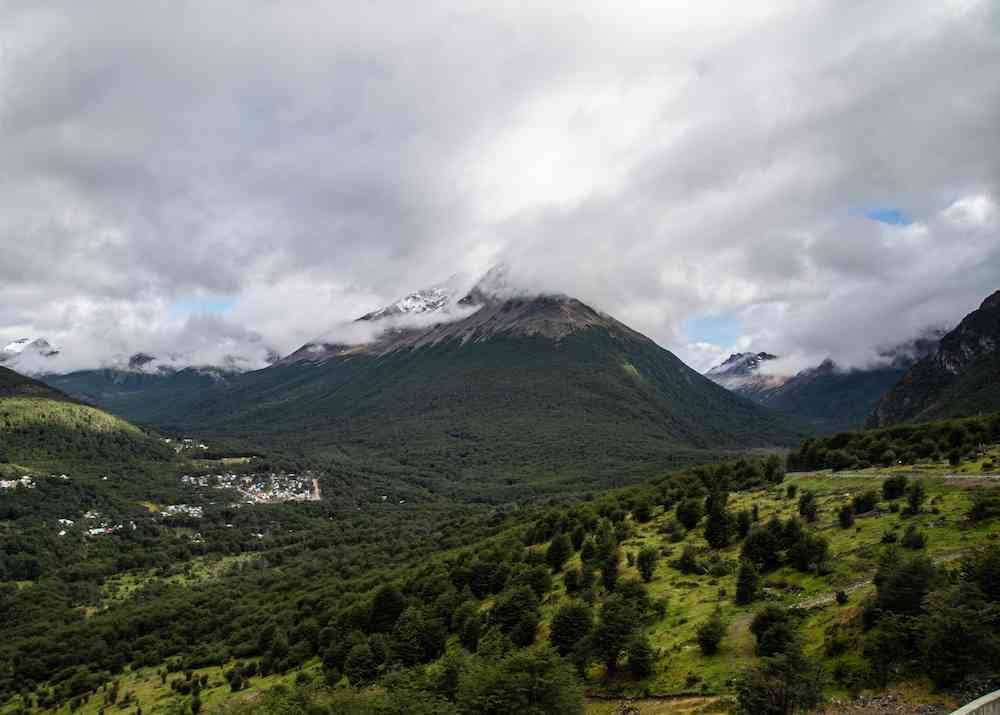
So you can expect to find a lot of young people out and about socializing and drinking in Ushuaia. But more on that in a bit!
Who Came to “The End of the World”? And Why?
The original indigenous inhabitants of Ushuaia were called the Yamana. As you can imagine, they were relatively quickly wiped out after Europeans set their foot ashore.
Ushuaia was re-established as a penal colony in the late 1800s. The Argentine government decided to send mass murderers, political prisoners, and other dangerous criminal sentenced to life here.
How to Get There: Now that Ushuaia is a hotspot for travelers instead of prisoners, the best way to get there is on a 3.5 hour flight from Buenos Aires.
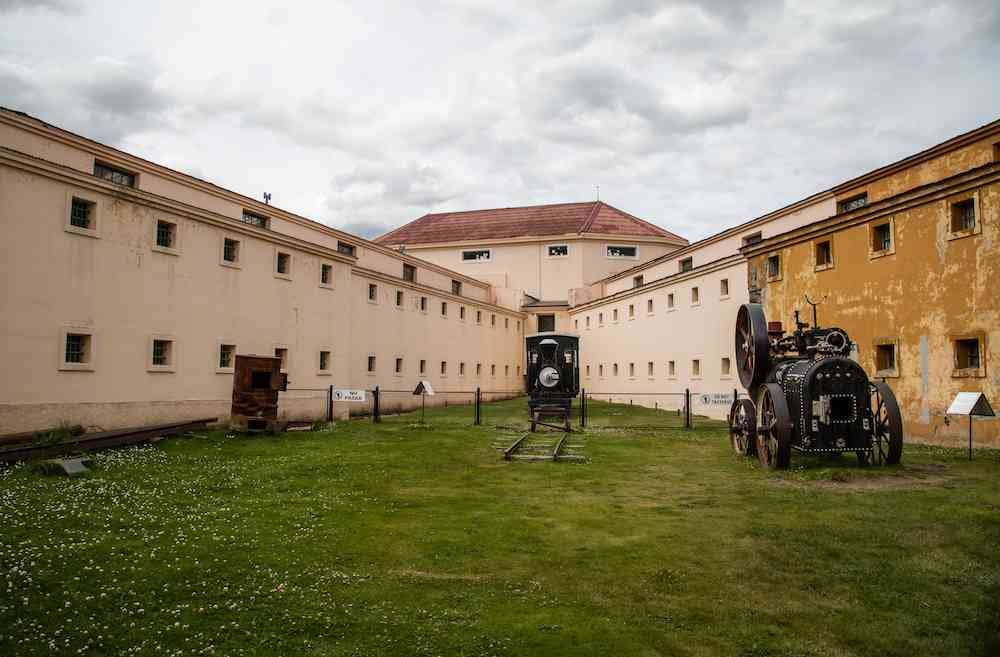
But who would build a prison at the end of the world? Well, the prisoners themselves it turns out. That’s right, the prisoners had to construct the jail cells that would eventually house them.
In fact, the prisoners would go on to provide labor for most public works projects that helped build Ushuaia up. Articles state that they were paid so they could send the money to their family. But the prison was also closed in 1947 due to bad sanitation and inhumane conditions. So perhaps they weren’t treated that well.
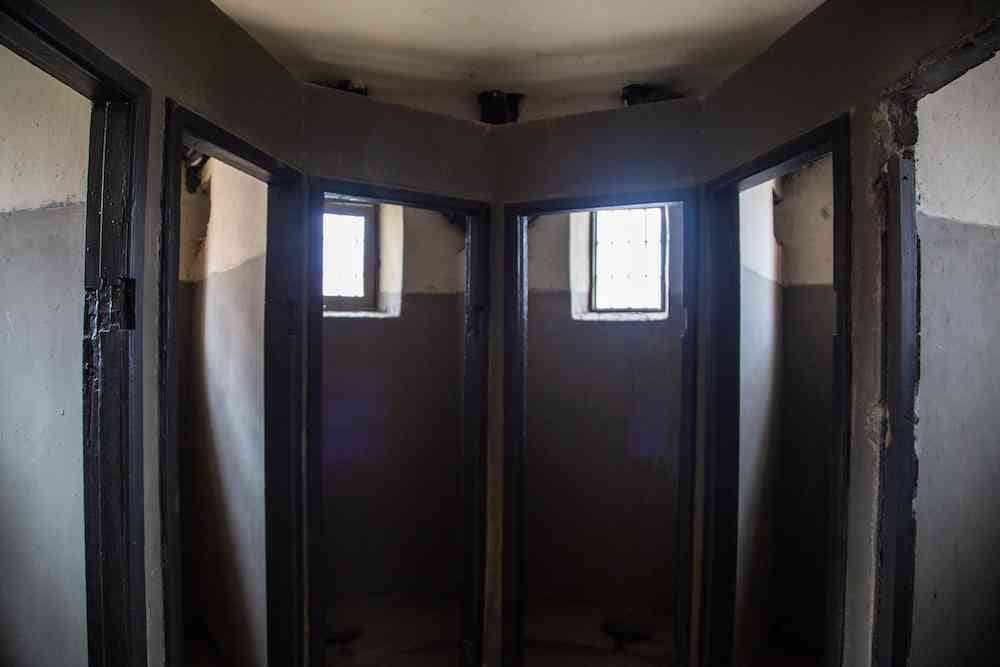
The point is, prison labor led to the construction of much of modern-day Ushuaia.
Maritime Museum & The Old Prison
Which takes us right to the list of what to do in Ushuaia. You might think visiting a crumbling prison wouldn’t be all that interesting, but you’d be dead wrong.
Or maybe I just like creepy shit. That’s also possible. Anyway, it’s one of the top things to do in the city.
Admission: 120 Pesos/$6
First, explore the maritime museum, then venture to the prison.
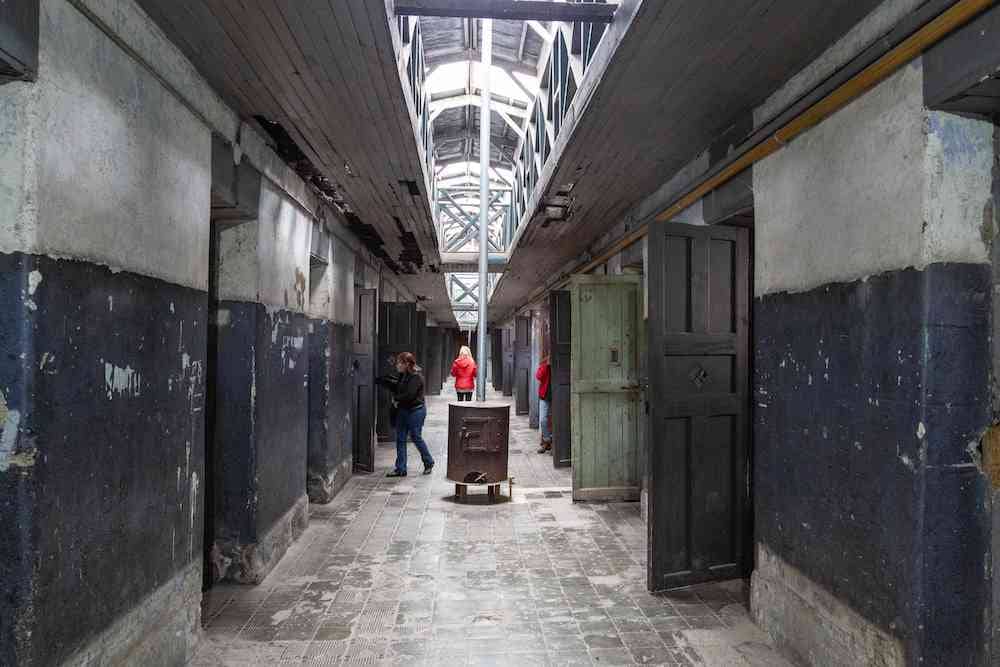
One section is restored, and includes recreations of prisoner life there, as well as specific prisoners’ histories. Serial killers and anarchist bombers were among the many infamous people housed here.
The old, dilapidated part of the prison makes for a really eerie atmosphere. Exposed to the elements due to the lack of restoration, the old wing of the prison is both metaphorically and literally spine chilling.
There were around 380 cells in the prison, but at its height the building held 600-800 prisoners.
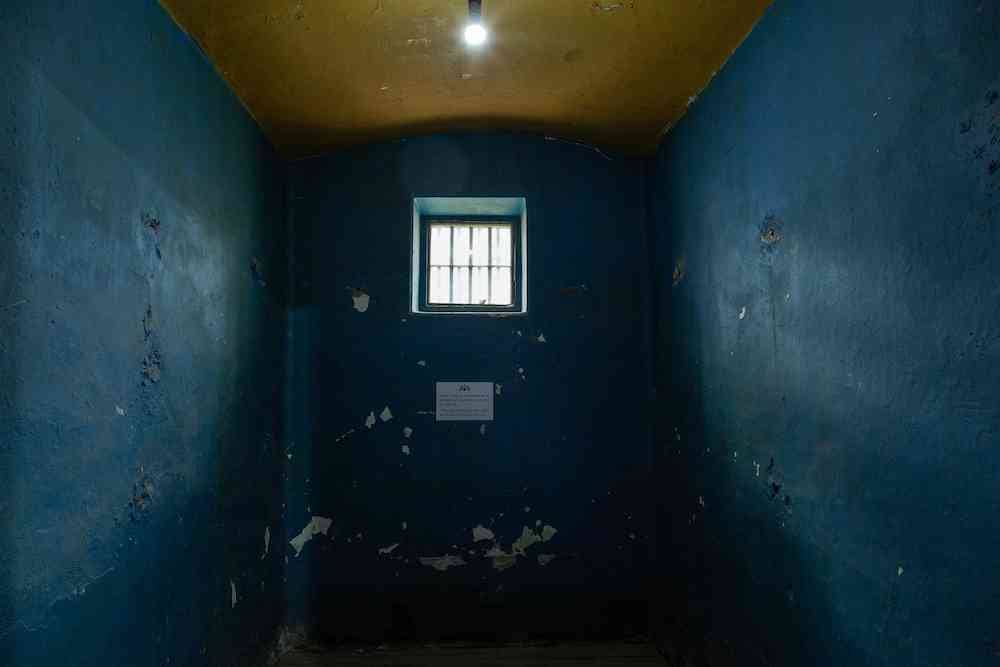
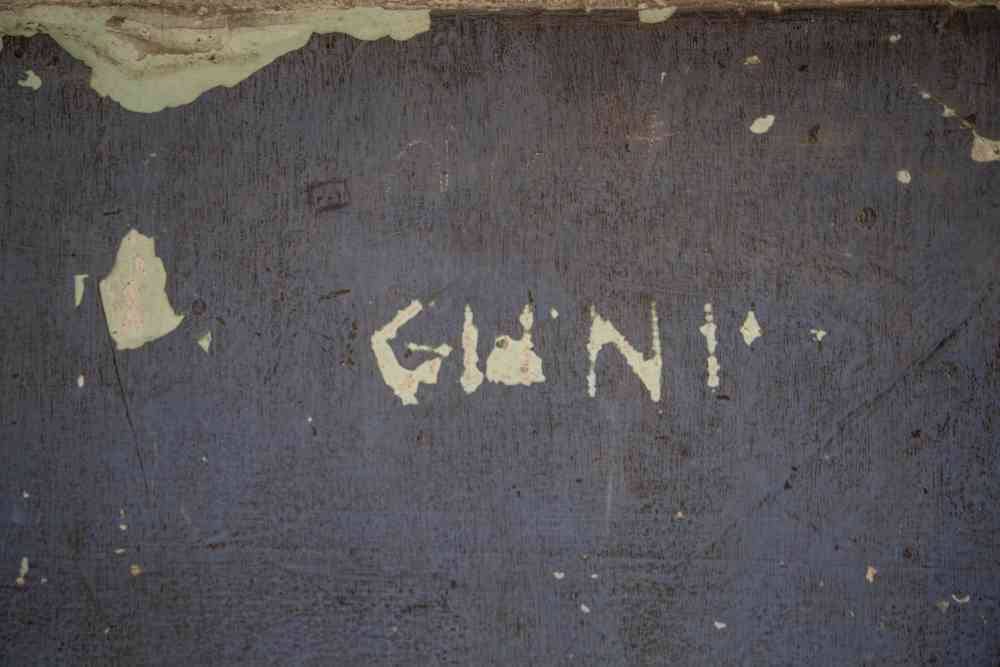
It doesn’t help that the cells were tiny, with just one small window to let in the light. Shower conditions, as seen below, were equally egregious.
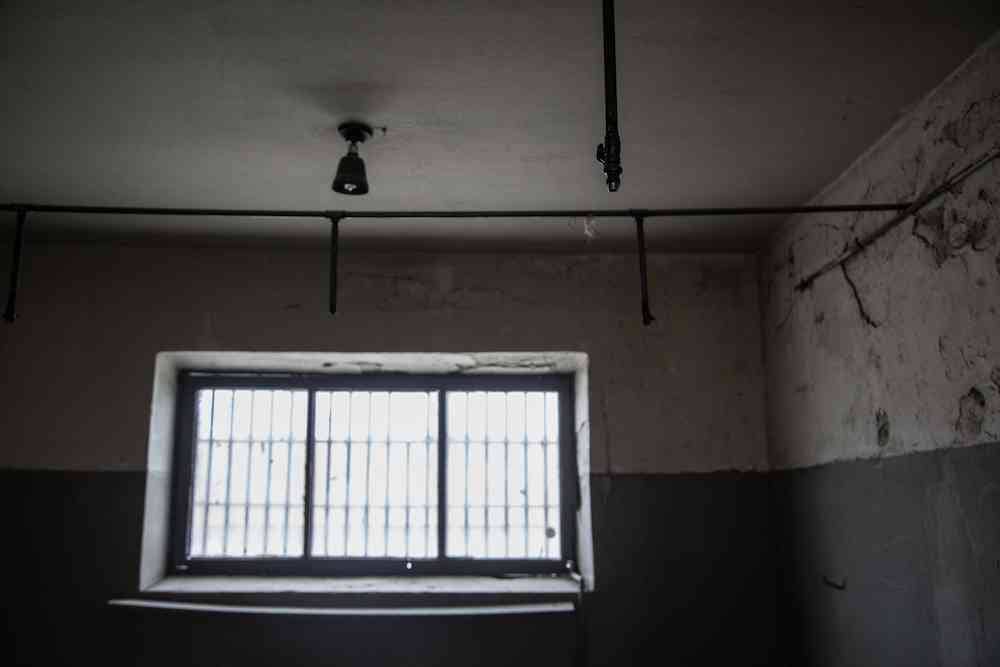
The second floor is so rundown you can’t even walk around it, just look out from the landing. As informative as the history in the restored prison wing is, it’s much more impactful seeing the conditions these prisoners actually lived in then.
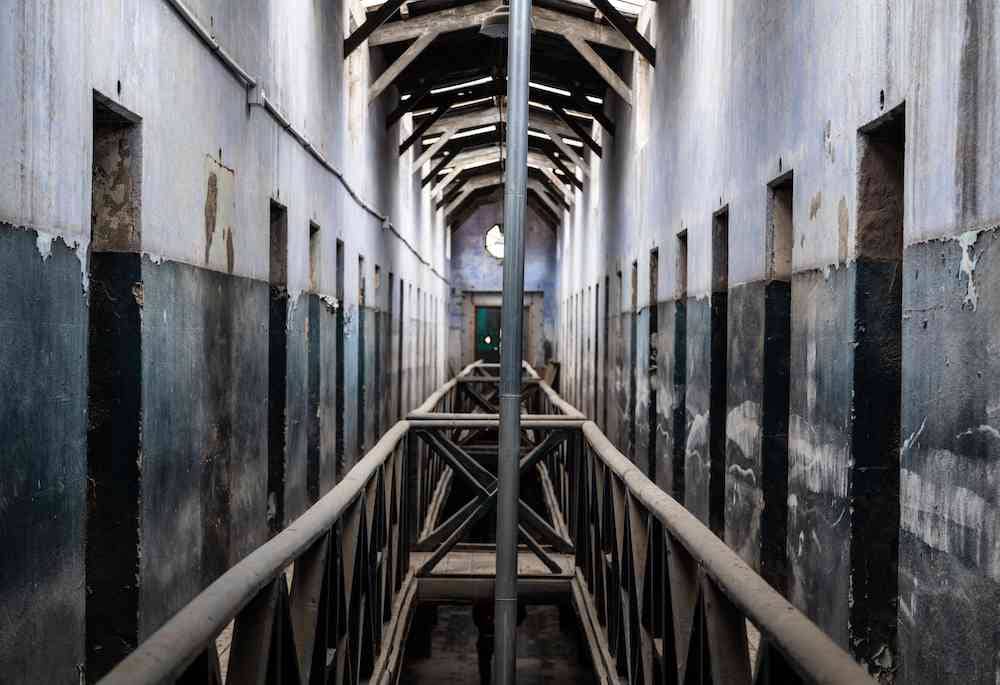
Today, the museum is on a functioning naval base. The incredible backdrop of snowcapped mountains and beautiful nature all around must have seemed taunting to the people jailed inside, an extra insult thrown at them during incarceration, tempting them with all the beauty they could never again experience.
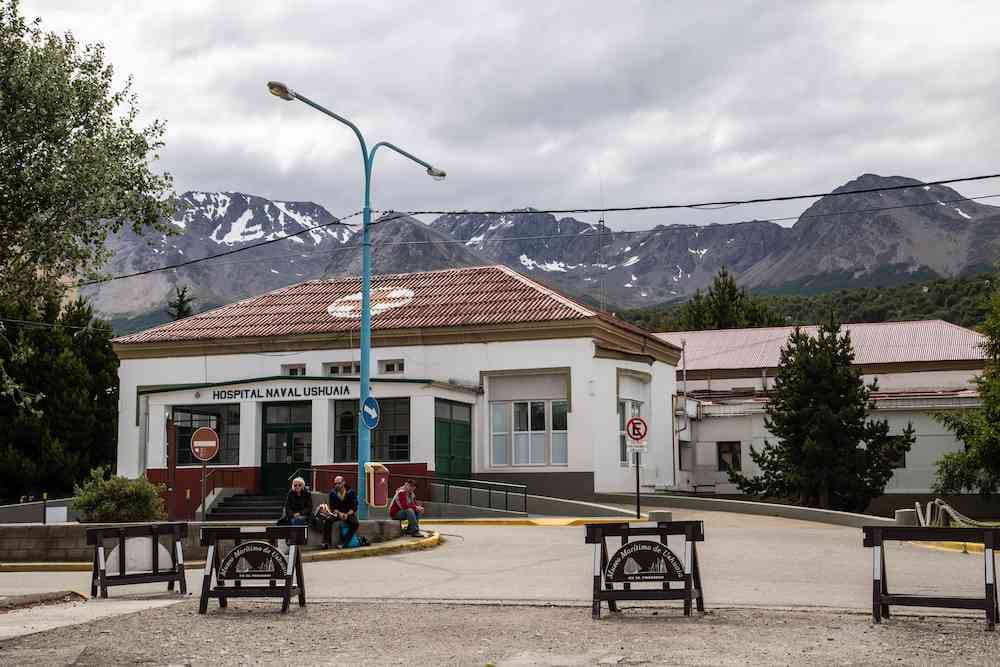
Enjoy Nature at Lapataia Bay
If you’d like to get away from the history of human suffering on your Ushuaia trip, Lapataia Bay is an amazing natural reserve to explore. I mentioned it briefly in my Patagonia post, but this is where the Pan-American highway ends from its start in northern Alaska.
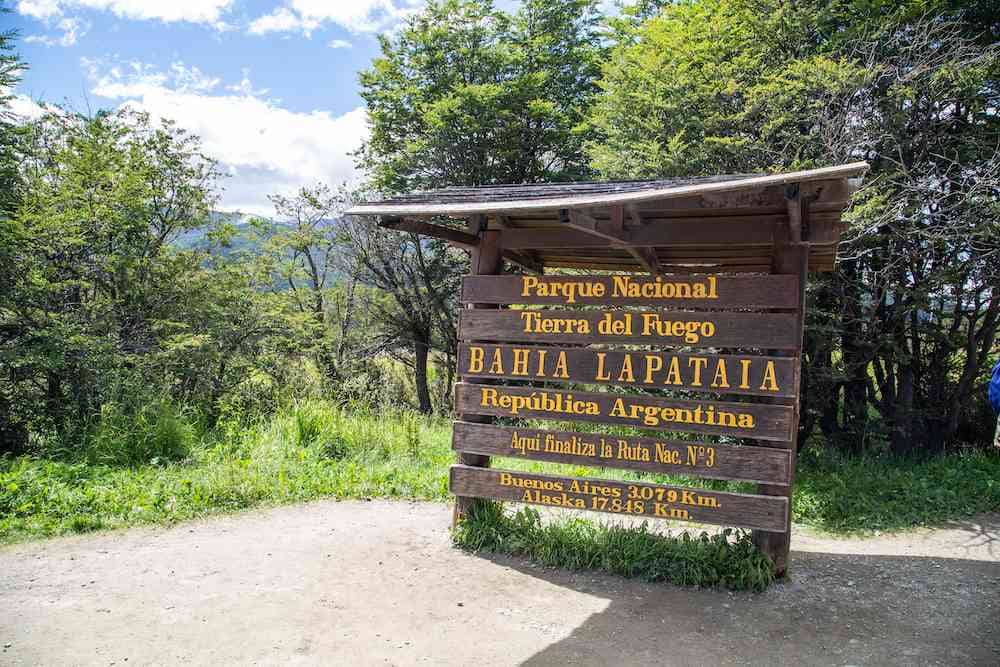
You can explore the area around the park and sit by the beautiful bay. Or take a short walk around, where you can find plenty of idyllic photo ops.
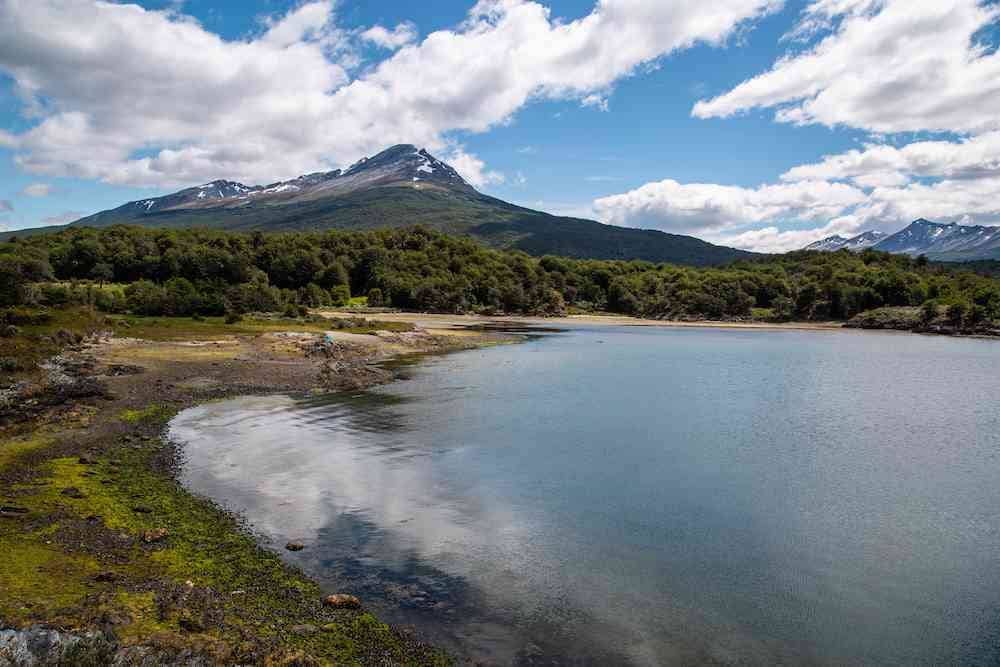
Hike Tierra del Fuego, Then Send a Letter From The End of the World
Ushuaia is right next to Tierra del Fuego National Park, technically part of Patagonia. Hike through the park as much as you want to discover the animals and plants that live there.
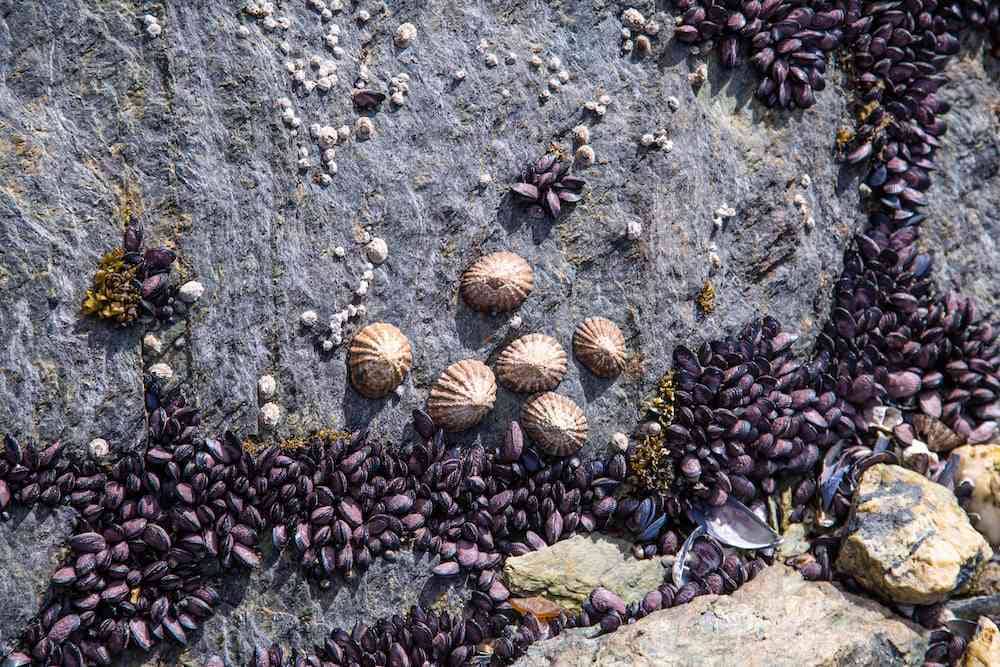
Make your way through the dense forest which almost blocks out the light, or meander by the beautiful, breezy seaside. Tierra del Fuego combines all kinds of stunning landscapes.
To get a better understanding of the flora and fauna you’re seeing, I highly recommend booking one of the many hiking tours available from Ushuaia.
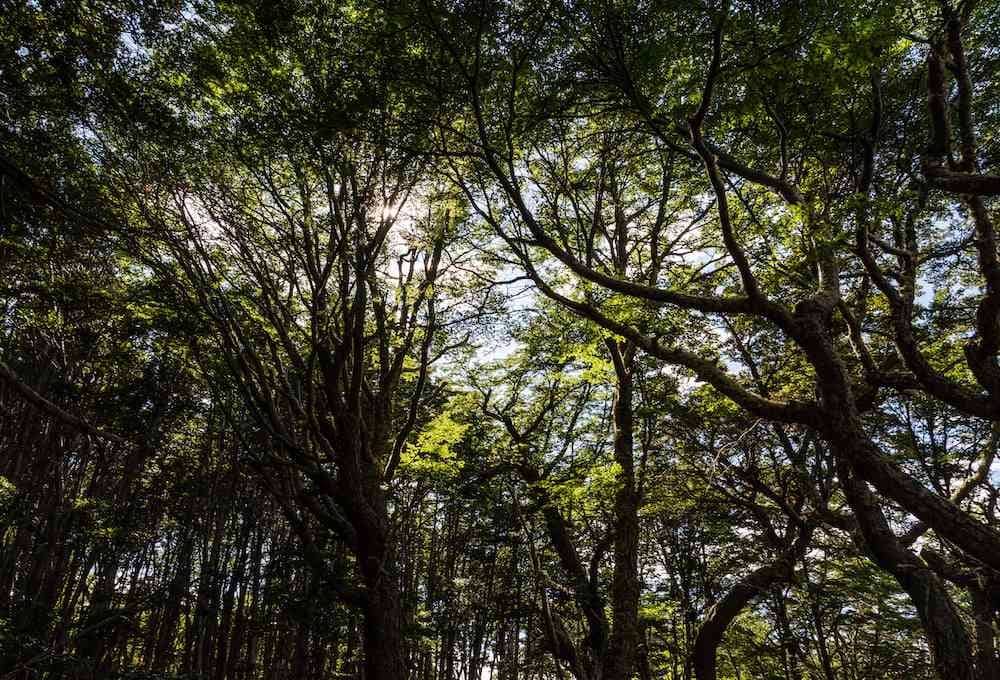
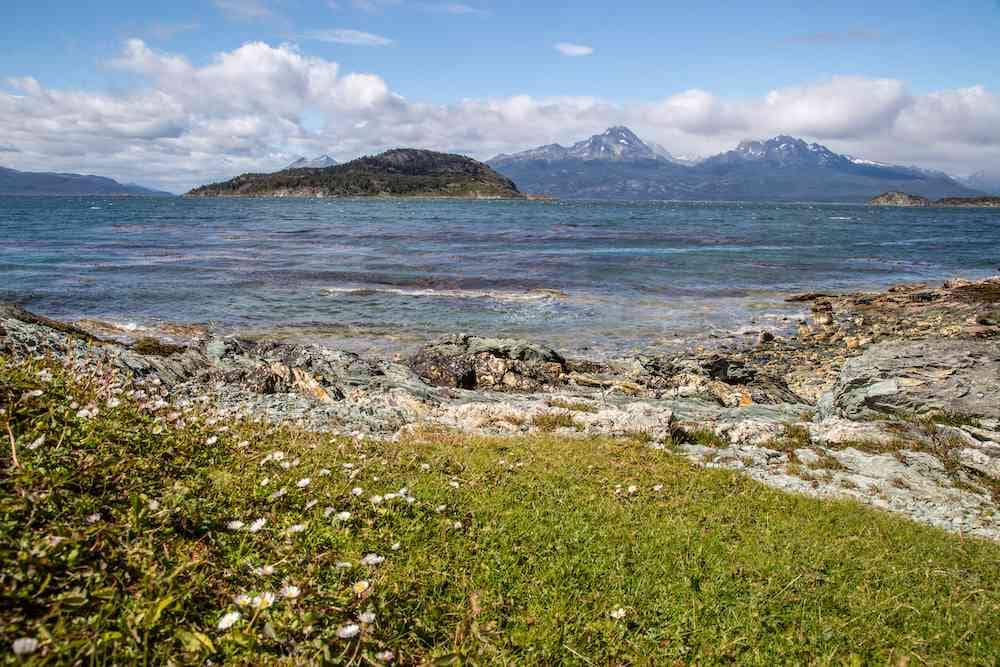
One of the biggest tourist attractions around this bay is the Post Office at the End of the World. It might seem cheesy, but it’s an Ushuaia must see. Send postcards to your friends and family from what is probably the hardest-to-reach post office anywhere.
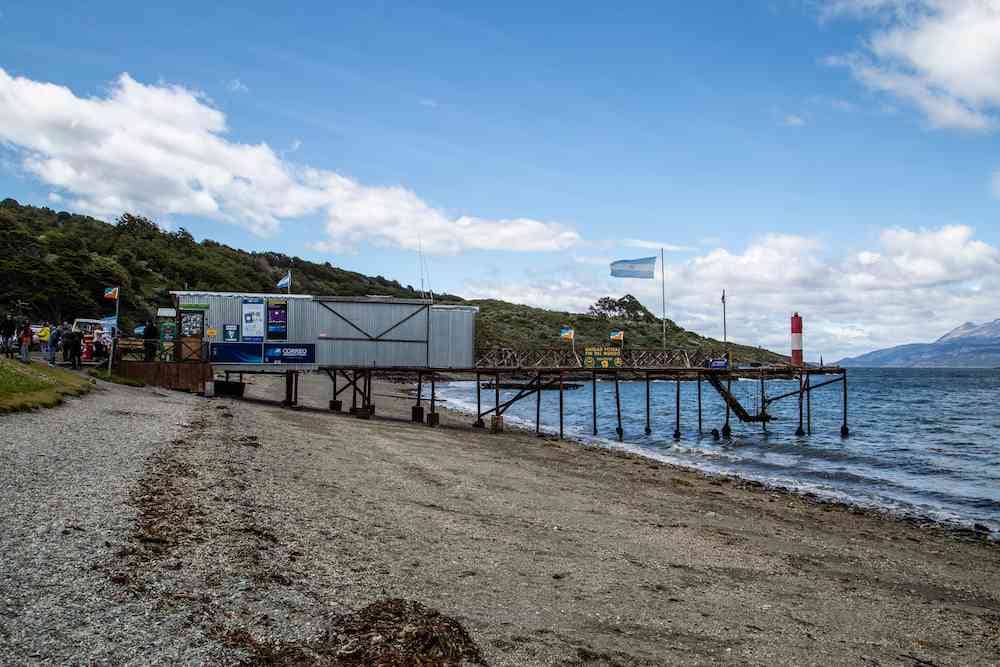
You can purchase postcards and stamps in the post office. They will be on the pricey side, and you may have to wait in line, but I think it’s worth it. My friends loved receiving a postcard from this outpost at the edge of the continent.
Fair warning though, by the time your friends and family get the postcards, it’s likely you will have returned from your trip several weeks, if not months ago. Turned a year older; added a child to your family, whatever.
I’m saying it takes. A minute.
St. Christopher Shipwreck
There’s another cool abandoned prominent structure around Ushuaia: the St. Christopher shipwreck.
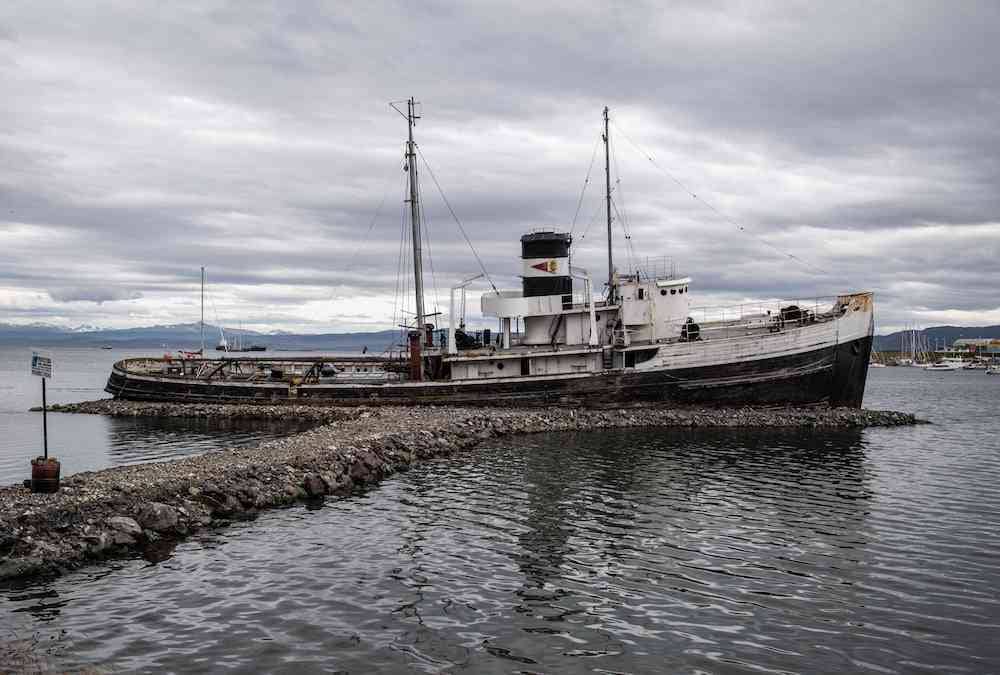
If you take a walk by the shore to get to Ushuaia’s famous sign, you can’t miss it. Local authorities say because of the way it’s positioned, they can’t move it or else it would sink. You can view the boat any time, but you can’t go inside.
Near the harbor, visitors can also catch a glimpse of other preserved buildings from the original port, built here in the early 1900s.
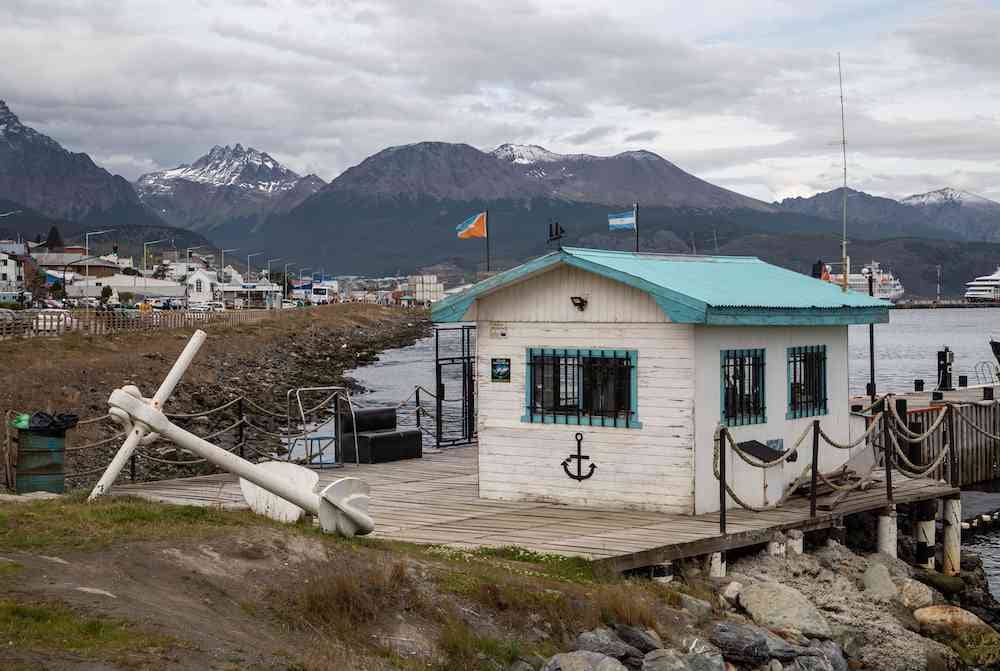
Back to the ship. St. Christopher was part of the British Royal Navy during World War II, but clearly ran into some problems. Pass it on the left and if you keep walking around the shore, you will get great views of Ushuaia and come upon the “letters” of the town.
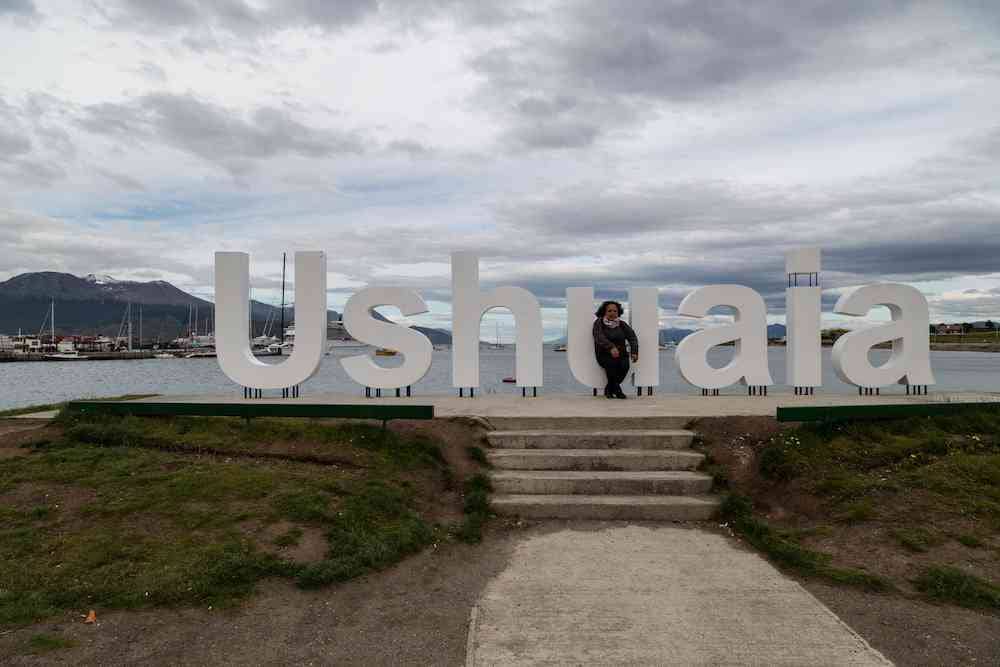
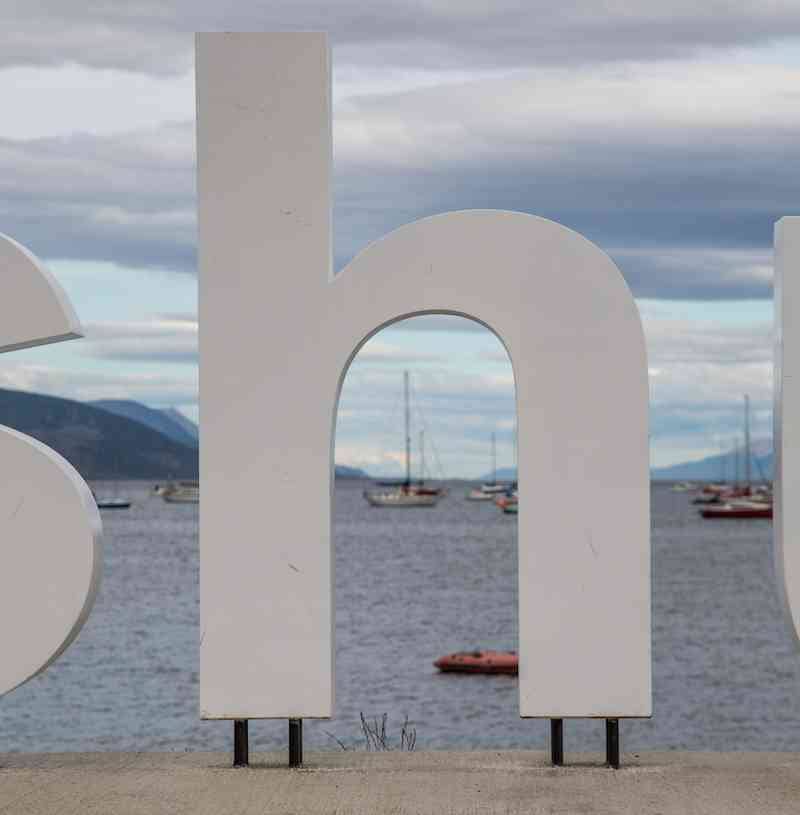
Quick Fact: The word “Ushuaia” actually comes from the Yamana language, also known as Yaghan. It means “deep bay”.
On this walk, you will come across three flags flapping in the near-constant Ushuaia wind.
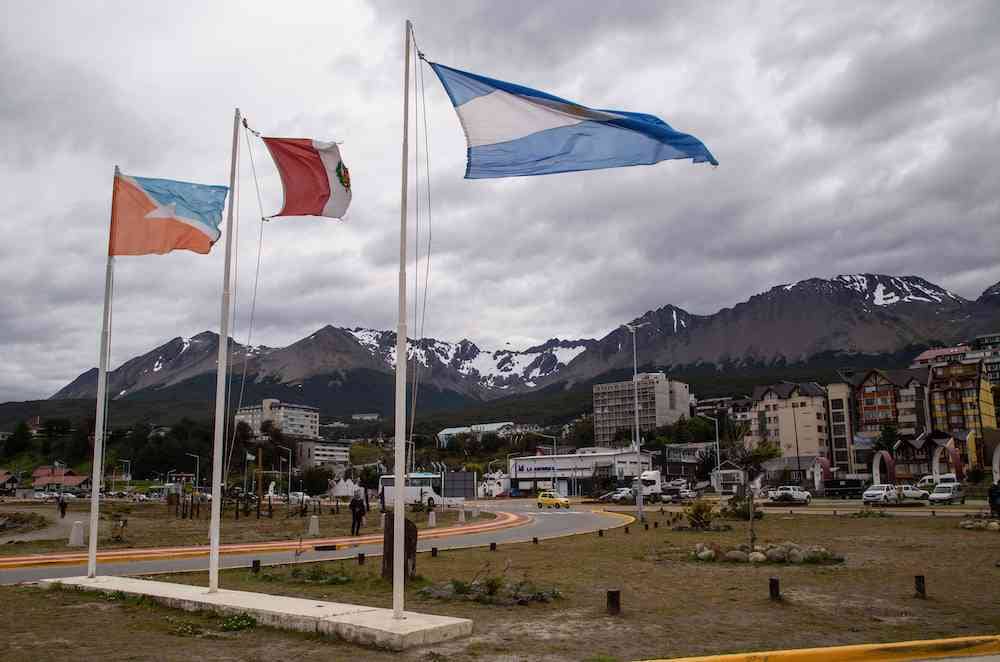
You can probably recognize the Argentinian flag on the right with the blue stripes, but what are the other two?
Well, the blue and orange flag is the flag of Tierra del Fuego, of which Ushuaia is actually the capital. As for the middle…I’m not sure. If anyone has any idea, please let me know in the comments.
What To Do in Downtown Ushuaia
Remember when I said that Ushuaia attracts a fair amount of young people? Well, for an out of the way town in such a cold and drizzly place, the city is pretty lively, especially at night.
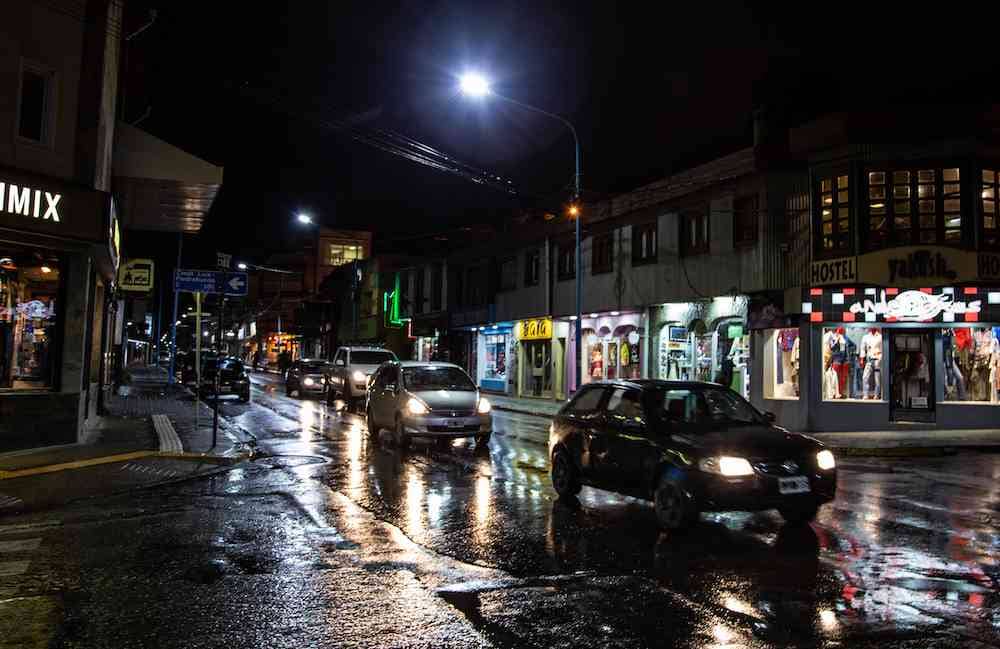
Taking a walk in downtown Ushuaia is a pretty great way to spend the time, day or night. You will come across great cafes and restaurants, cool little shops to poke around in, and plenty of people to meet from around the world!
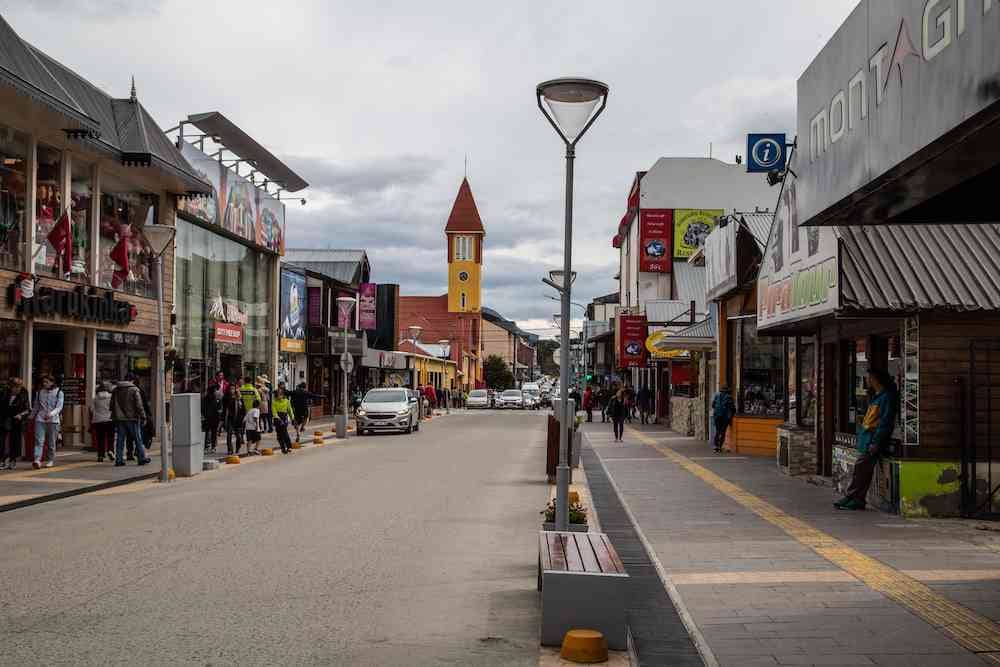
In addition to seemingly every “outdoorsy” brand in the world setting up shop here – for obvious reasons – Ushuaia has some other cool things to check out. Including some great street art:
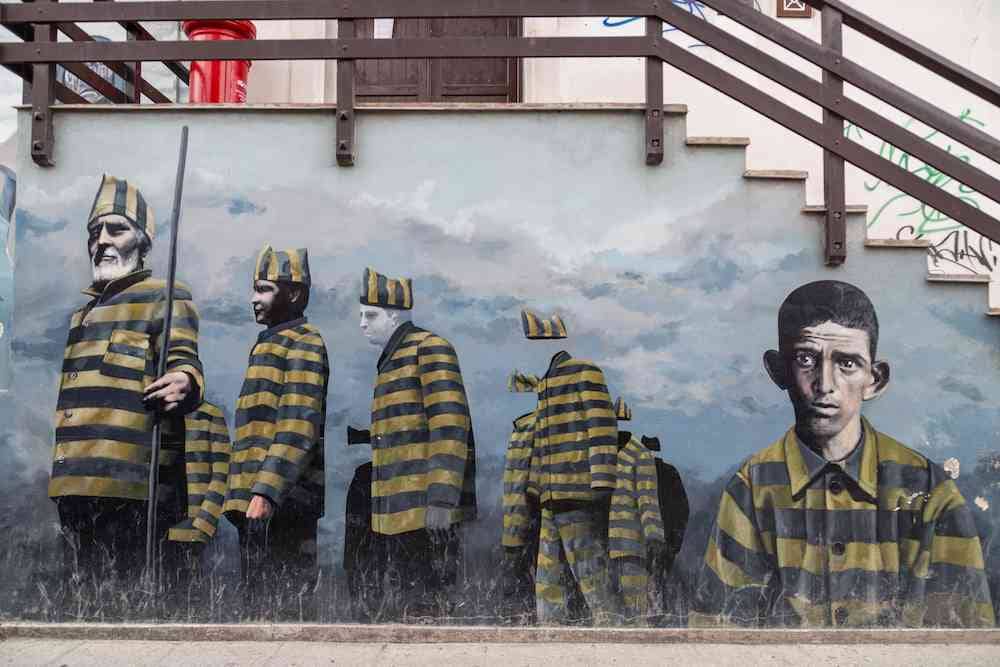
Best of all, when you walk up and down the city streets long enough, you find some truly incredible spots from which to photograph the town.
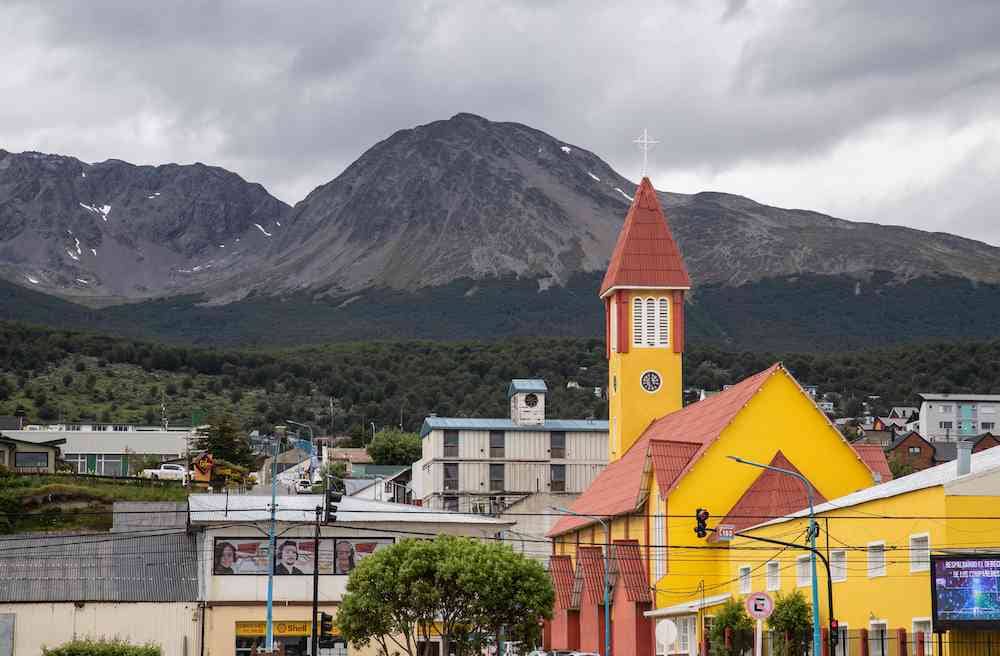
To be completely upfront, there are parts of Ushuaia that are somewhat unimpressive and industrial looking, much like any bigger city. It is, after all, founded on a history of shipping and industry, and big ports generally always look unappealing.
This is why, as with most places I visit, I found Ushuaia even prettier at night. The main streets and shops were all lit up, and the ugly industrial side hidden.
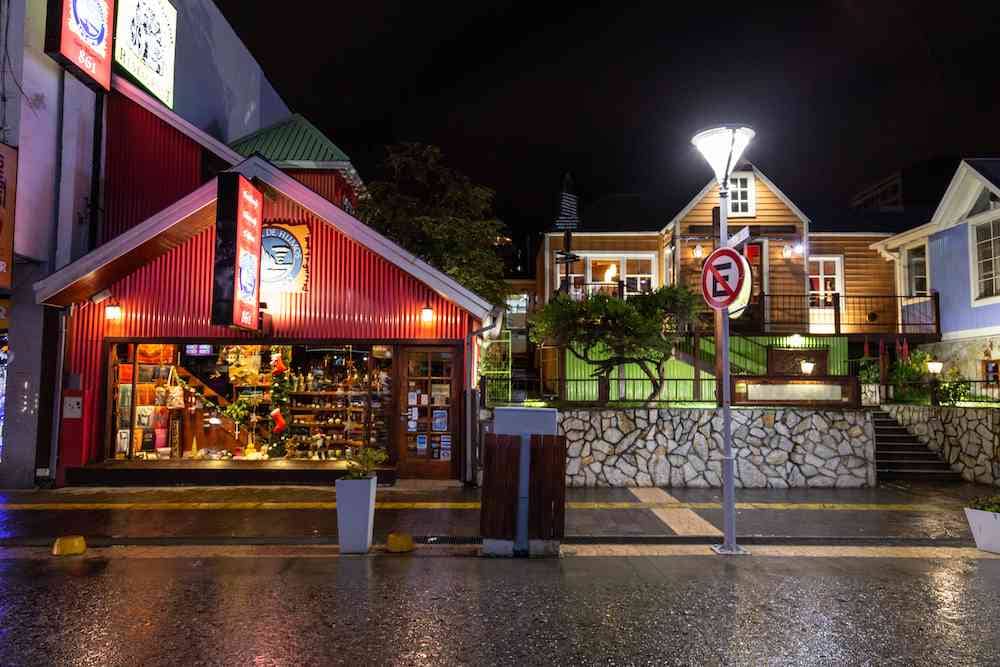
Ushuaia Nightlife
Almost every bar and restaurant we walked into was JAMPACKED with people letting off steam after a full day’s work or a long hike. The night before departing for Patagonia, we finally settled into one that was standing room only until a table opened up.
If you’re in the area, definitely try some of the local craft beers. Patagonia is actually somewhat of a beer production hub; you can even get a Patagonia brand beer.
Half the people around us were local tour guides who were clearly celebrating a couple of days off. The atmosphere was almost like a college bar; young, fun, informal, chaotic.
Arakur Ushuaia Resort & Spa
After several (too many) drinks, I got back to our hotel – the Arakur Ushuaia Resort & Spa – just outside the city, looking down on it all. For those who don’t want to be in the center of things, I highly recommend this somewhat remote hotel. Around 15 minutes from the city center, it has an excellent restaurant, incredible views, and a great spa and pool.
The Arakur Resort provides a shuttle into town. But, if you’d rather be in the mix of things, especially at night, you’re better off staying downtown.
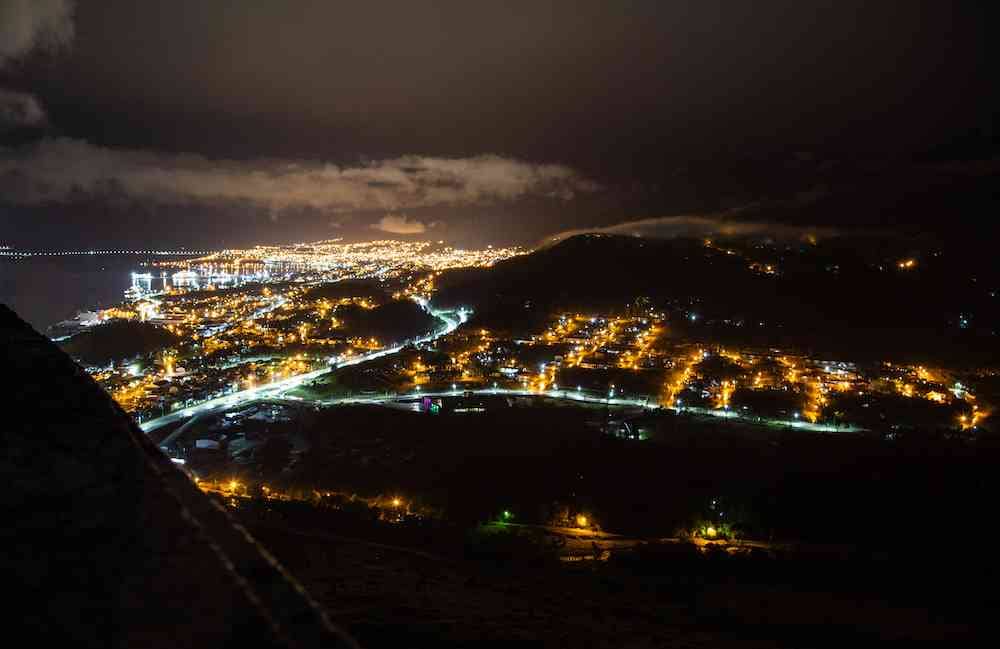
At the end of the day, I think Ushuaia offers an interesting insight into an eccentric place and town with a strange and often harsh history. It’s a great place to get a feeling for the isolation, wilderness, and faraway feel of Patagonia, Antarctica, and all the tremendous journeys for which Ushuaia is usually Stop 1.
The city is summed up best by its motto: “Ushuaia, end of the world, beginning of everything”.


